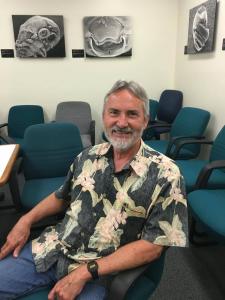Robert Kope

Voices from the Science Centers
Voices from the Science Centers is an oral history initiative dedicated to documenting the institutional knowledge of fisheries scientists and administrators in the labs of NOAA’s Fisheries Science Centers.
Robert Kope was born in Reedley, California in 1953. He received his PhD in Population Ecology from the University of California Davis and began working for NOAA Fisheries at the Southwest Fisheries Science Center in1989.His work has focused on stock assessments, harvest management, and conservation biology of salmon in northern California. In 1994, Robert moved to the Northwest Fisheries Science Center to participate in the coast-wide status review of all Pacific salmon species under the Endangered Species Act. He currently serves on the Pacific Fishery Management Council Salmon Technical Team and the Pacific Salmon Commission’s Chinook Technical Committee.
Interview contains discussions of :NOAA, NMFS, Southwest Fisheries Science Center, Northwest Fisheries Science Center, population ecology, stock assessment, conservation biology, salmon, Chinook salmon, Endangered Species Act, Pacific Fishery Management Council and Pacific Salmon Commission.
In this interview, Robert Kope discusses his career as a biologist with the NMFS. He originally began working in timber management with the Forest Service, but chose to switch careers after developing arthritis in his 20s. He originally worked in the Southwest Tiburon Lab as the only salmon fisheries biologist, but moved to a conservation biology position at the Northwest Lab after becoming involved in coast-wide status reviews of salmon.
After finishing the coast-wide status reviews of Chinook, coho, pink, and chum salmon, he began providing technical advice to the Pacific Fishery Management Council and the Pacific Salmon Commission.
Kope also discusses technological advancements in computing as having the greatest impact on his field, particularly for data analysis and modeling. Genetics and genome sequencing have allowed him to gain a better understanding of stock distribution. Kope plans on retiring within the next five years after helping to renegotiate the Chinook Chapter of the Pacific Salmon Treaty.
Please Note: The oral histories in this collection are protected by copyright and have been created for educational, research and personal use as described by the Fair Use Doctrine in the U.S. Copyright law. Please reach out Voices@noaa.gov to let us know how these interviews are being used in your research, project, exhibit, etc. The Voices staff can help provide other useful resources related to your inquiry.
The NOAA mission is to understand and predict changes in climate, weather, oceans, and coasts, to share that knowledge and information with others, and to conserve and manage coastal and marine ecosystems and resources. The Voices Oral History Archives offers public access to a wide range of accounts, including historical materials that are products of their particular times, and may contain offensive language or negative stereotypes.
Voices Oral History Archives does not verify the accuracy of materials submitted to us. The opinions expressed in the interviews are those of the interviewee only. The interviews here have been made available to the public only after the interviewer has confirmed that they have obtained consent.
